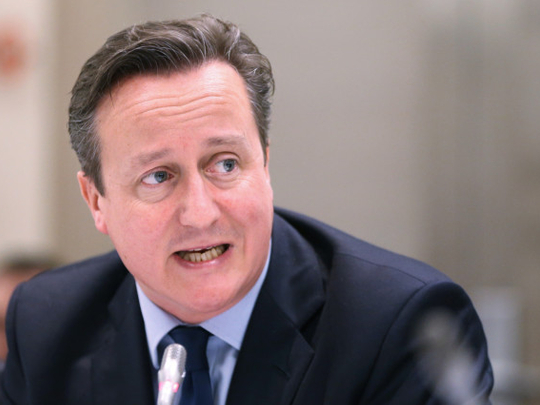
A mere opinion poll that came out last week must count as one of the political moments of the year in Britain. It did not gauge anything as tangible as voting intention, the popularity of the party leaders or their perceived economic competence. Instead, respondents were asked by ComRes to put the parties on an ideological scale, running from 1 (left-wing) to 10 (right-wing).
According to Britons, the most extreme party of any note are the governing Conservatives. With a score of 6.9, they are seen to languish farther from the centre ground than a Labour party fronted by “Red” Ed Miliband, the most avowedly leftist leader of the opposition for a generation.
The Tories are more right-wing than the grouchy populists of the UK Independence Party (Ukip). The anti-austerity, anti-nuclear, anti-fracking Greens, who would renationalise the railways and stamp out independent schools within the state sector, are nearer the centre than the Conservative party. So is the celebrity anarchist Russell Brand and the Prince of Wales, whose grievances with modernity seem to begin with the Industrial Revolution.
For any Conservative who favours power over doctrinal purity, and there are still some, this data should chill the blood. Their party has not profited very much from Labour’s entirely predictable seepage of support this year and the ComRes finding helps to explain why. People rate the Tories as stewards of the economy and David Cameron as Prime Minister, but there are three variables that shape a party’s electoral prospects, not two. As well as leadership and economic trust there is the airier question of a party’s reputation or brand. The Conservatives’ brand is still so foul as to nullify their strapping advantage on the other two variables.
At some indistinct point in the 1990s a nebulous view of the Tories as sour, hard-faced people calcified in the public mind. The party’s failure to do much about this since then, beyond the three-year stab at “modernisation” with which Cameron began his leadership, is a corporate failure as deserving of study as the decline of Nokia and Kodak. Complacency, slowness to innovate, estrangement from modern citizens and their evolving habits: It is the same kind of story.
The most dangerous sickness is one you do not know you have. Conservatives do not know they have a reputational problem. Or at least they have ceased to talk about it. Modernisation, which lifted the party to 50 points in the polls by 2008, has become something to be lived down and remembered with a wince, like a bacchanalian night out. Cameron himself hardly mentions it. Meanwhile, unreconstructed right-wingery has never been more influential in the party since it drove the Tories into the ground in the 2001 and 2005 elections.
The party has become a Bizarro World in which vote-losing right-wingers strut around like doctors who have reclaimed the asylum from its lunatics, while modernisers responsible for the Tories’ one brush with popularity in the past quarter of a century sit cowering in the corner.
Cameron’s leadership, now in its 10th year, began with psephological insights that have lost none of their wisdom or relevance. They just seem to have lost his fealty.
What are these insights? Three stand out. A popular policy can lose votes if it confirms suspicions about the party presenting it. When too many policies of a similar ideological type are combined, voters hear the chord rather than the individual notes and it jars. Above all, superficialities matter. If a party does not radiate moderation and good intentions, nothing it says will get a fair hearing, however sane or well-thought through.
It is extravagant nonsense to suppose that Ukip or the Greens really are more centrist than the Conservatives. But it is the Conservatives’ fault that this impression exists. They have had years to shake hostile perceptions of themselves by doing counter-intuitive things. When they tried it, they soared. At the end of it all, however, they are going into yet another general election on a narrow platform of fiscal tightness, euroscepticism and anti-immigration. If anything saves them, it will be Labour’s own terror of venturing outside its ideological comfort zone. This election is an unpopularity contest between two parties talking to themselves.
At this point, it is customary to advise a course of action. But the election is five months away and Cameron will not change his pitch to voters. There is too much pressure on him from Tories convinced of the wide appeal of their ideological hobby horses. And they are right: Getting tough on Europe, welfare and migration is popular. Chocolate is popular, too, but eating it to the exclusion of all else makes people queasy.
— Financial Times









